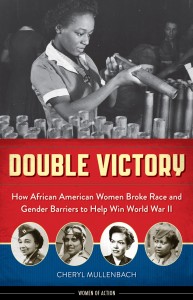You only wanted a job.
You needed a little spending money, a way to put food on the table, something to do that meant something or made a difference. So you applied for positions that sounded good and paid well, or seemed interesting and came with opportunity.
Humans, it’s believed, are wired for work. We need to contribute somehow, in some meaningful way. But as you’ll see in the new book “Double Victory” by Cheryl Mullenbach, some jobs don’t come without a double battle.
Shortly after the U.S. entered World War II in 1941, a desperate call went out for workers because America ’s men were going to war. White women were encouraged to do the jobs their men had left behind. Black women wanted to do their part, too. They saw a chance to help win the war and to make better money: many of them were getting $2 a week as domestics, while factory jobs might pay twenty times that.
Time and time again, however, they were turned away – even though President Franklin Roosevelt had signed Executive Order 8802, which encouraged “full participation in the national defense program by all citizens… regardless of race…”
Emboldened, black women kept trying for jobs and, eventually, despite ongoing discrimination, there was such a strong need for workers that some were finally hired (although still segregated). At first, the jobs were menial or purposely difficult in the hopes that the women would quit.
But they didn’t, which encouraged other black women to bust barriers wide open. Even Black Hollywood got into the effort to win the war.
When the government finally allowed black men into the Armed Forces, black women leaped to join, too, and were accepted into the WAAC (Women’s Army Auxiliary Corp, later just WAC) in 1942. They still faced segregation but were finally allowed to “do their part” at home and overseas. And yet, despite that they sacrificed in service to their country just as their white countrymen did, when the war ended, there was just more discrimination.
No doubt about it, Double Victory is an eye-opener, especially for the generations born post-WWII.
Through interviews, newspaper accounts, books, documents, and diaries, author Cheryl Mullenbach tells the story of a courageous group of women who were determined to serve their country, even when it seemed that no one wanted them to. It’s shocking to see how black women endured more severe discrimination than did their male counterparts, and I was surprised at the almost-ridiculous the lengths to which segregation went to keep black women as more than second-class citizens. I almost wanted to cheer as I read each individual story that Mullenbach includes here; these were women who were tough as nails and as tenacious as pitbulls in Army-issued “exercise dresses.” Seriously, how cool is that?
While this seems to be a book for teen readers, I surely think adults will get just as much out of every word here. If you’re looking for a book with an until-now-quiet story, Double Victory will do the job.
Double Victory by Cheryl Mullenbach (Chicago Review Press, $19.94, 266 pages)






Comments are closed.